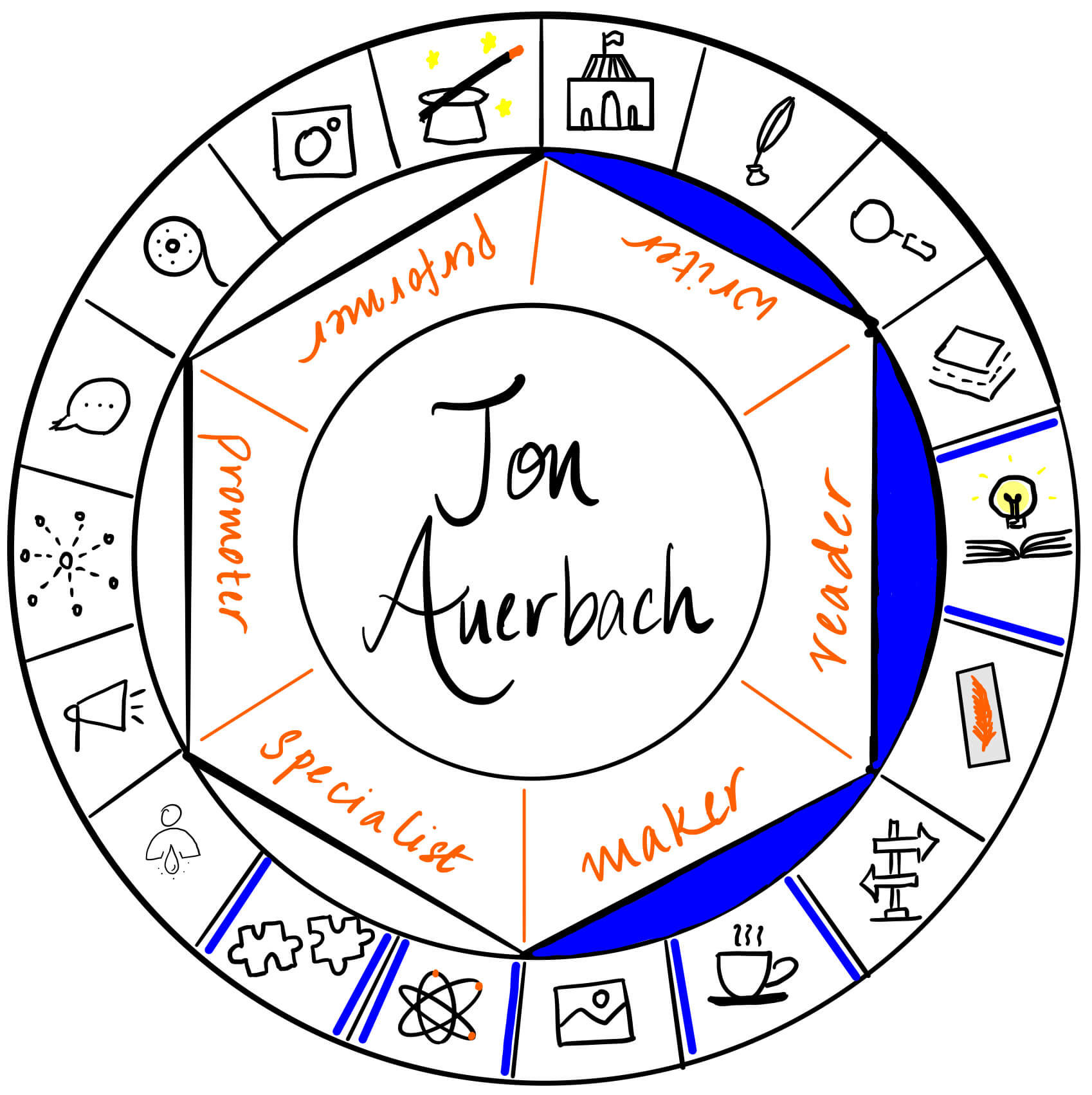
Welcome, friends! I am excited to bring back the Creator’s Roulette in 2021 and want to give a special thanks to Jon Auerbach, our honored guest today, for reviving my series. 🙂 He is sharing about starting a Kickstarter campaign for a novel. Previously, Betsy Miller from Thinking Ink Press had shared about crowdfunding a similar endeavor, and today, we will build on that knowledge. First, a little bit about Jon.
Jon Auerbach’s love of fantasy began at the tender age of six, when his parents bought him the classic 1977 animated version of The Hobbit. Jon hopes to pass on his stories to the next generation, including his kids, who have their own copy of The Hobbit that they lovingly call “the Bilbo book.” He shared his insights on creating a secret magical organization on the blog last year. Let’s learn more from him!
Creating a Fiction Kickstarter campaign
By Jon Auerbach
We’ve all seen those Kickstarter projects where someone raises millions of dollars for a new smart watch or a movie of a cult hit TV show or even a card game about exploding felines. And there have been comics and board games a plenty that have built fanbases and even companies.
But until recently, fiction on Kickstarter has been a relatively quiet place. Michael J. Sullivan has been an early advocate of the platform and even started his own campaign on a dare to prove to an author friend that it could work. Seven campaigns later and Michael is putting out all of his new books first on Kickstarter.
Then there was Brandon Sanderson’s Way of Kings 10th Anniversary Leatherbound Edition campaign, which blew up last summer and raised over $6.7 million, to date the most funded campaign in the fiction category in Kickstarter history.
Authors both traditionally and independently published are starting to recognize that Kickstarter provides not only a viable way to make money on their novels, but as a way to grow their fanbases with each successive campaign.
But Kickstarter is not a place of instant riches and success. It takes hard work, planning, project management, and a host of other skills. As an indie author and frequent Kickstarter backer, seeing the success of other authors on the platform got me thinking about whether a campaign was doable, given where I am in my author career.
Learning the platform
Kickstarter is not your typical e-commerce store. It’s a crowdfunding platform, one that’s been around now for a long time in Internet years. As such, there are certain expectations that frequent Kickstarter backers will expect to see in a campaign. Fortunately, every campaign that has been launched on the platform and not canceled is available to view, providing a wealth of information.
All campaigns are sorted into various categories, such as comics, illustration, games, and fiction. You can go digging for past successful campaigns, but the best way to start your research is to back other campaigns that are live right now. You can contribute a dollar and you’ll receive all campaign updates so you can get a front-row seat for the different phases of a campaign.
Also, by backing other creators, you will show your future backers that you’re invested in the platform and not just using it to make a quick buck.
Determining the scope of the project
After you’ve got a handle on how campaigns are structured, you’ll want to determine what the scope of your project will be. Are you launching a brand-new book? A collected edition already published novels? Or just trying to learn by doing and going for a simple campaign for a novella maybe? Once that’s decided, the next step is figuring out many different formats you will offer and what non-book items you will also include. Originally, I was only planning on offering a paperback version (in addition to e-book and audiobook), but found after a bit of research that hardcover books would also be feasible.
The one thing you should try to avoid is analysis paralysis, that feeling you have when there are seemingly an infinite number of choices and combinations of what you could do. Try to keep things simple and straightforward; after all, you’ll have to explain to potential backers what it is you are offering in the campaign. And remember, at the end of the campaign, you will have to ship whatever rewards you’ve promised, so maybe don’t offer porcelain miniatures unless you plan on hand-delivering them to every backer.
Know your P’s and L’s

Now that you’ve determined your scope, you can calculate what it’s going to cost to create each reward tier. If you are an Excel wizard already, you will find those skills will come in very handy at this stage. You’ll need to factor in Kickstarter’s cut of your funding as well as payment processing fees, and of course, production, packaging, and shipping costs.
With your base cost per item calculated, you can price your reward tier appropriately so that you will be able to make a profit on each incremental backer.
It’s always important to triple check your math. Several days into my campaign, I found an error in my math that put the cost of a reward a dollar higher than it actually was. That adds up the more backers you get, especially if you accidentally underestimate your costs, so make sure you are properly pricing your reward tiers before the campaign goes live.
Assembling a project team

Indie authors are used to assembling and working with a production team, but a Kickstarter campaign presents unique issues/challenges depending on the project scope.
Perhaps you’ve commissioned cover art before for e-books but have never created physical books, or hardcovers with dust jackets. Or you want to add interior illustrations or maps to your book, or art cards or poster prints or even coins.
Whatever the scope of your project, you will need multiple people to help you pull it off. Plan for lots of lead time before the campaign so that you can identify who you want to work with and fit your project into your team members’ schedules.
Marketing/audience building
In some Kickstarter categories, there are frequent backers (dubbed “superbackers”) who use the platform as another retail channel where they frequently go to buy new and upcoming products. There is less the case in the fiction category, but as additional authors create fiction campaigns, that audience will continue to grow. What this means is that you will need to get your existing fans and your family and friends to come out early in the campaign to help it get off the ground, so that you can attract people browsing Kickstarter who have never heard of you before to click on your project.
But don’t be discouraged thinking that you need to have a huge audience before you even consider running a Kickstarter.
The beauty about Kickstarter is that unlike with Amazon, you are able to contact all of your previous backers when you launch subsequent campaigns. Over time, as you run additional campaigns, you’ll start to attract new backers each time, growing your audience.
You can certainly wait to build a sufficient audience off of the Kickstarter platform if you want to run a campaign with an enormous budget, but you can also do a moderate project and get the ball rolling.
Additional resources
I’ve spent a lot of time reading and learning about Kickstarter and I wanted to share some of the helpful resources I found.
- Kickstarter Best Practices for Fiction Writers: All the Ins and Outs of a Fiction Kickstarter. This free online course by Dean Wesley Smith and Loren L. Coleman should be your starting point. The online lectures and best practices document will walk you through the different aspects of a Kickstarter campaign, and there is also a special section analyzing Brandon Sanderson’s Kickstarter campaign mentioned above.
- Jamey Stegmaier’s Kickstarter Lessons. Jamey runs Stonemaier Games, a board game company that has launched a number of successful projects on Kickstarter. Jamey has written dozens of Kickstarter lesson blog posts over the years and this list of posts is organized by topic.
- ComixLaunch Podcast As the name suggests, this is a podcast about using Kickstarter and crowdfunding to launch comics, but its lesson are also applicable to the fiction category. There are interviews with comic creators who have launched successful campaigns, and host Tyler James also does topical episode on various aspects of the Kickstarter platform.
If you’re an author, have you considered creating a Kickstarter campaign? And if you’re a reader, have you backed a fiction campaign before?
I hope you enjoyed this post! Connect with Jon on Twitter (@JAAuerbach), Facebook, Instagram (@jaauerbach_author), and Goodreads, and his Kickstarter campaign for his epic urban fantasy novel Guild of Tokens is currently running through February 25.
Thank you so much for reading. 🙂

All images except the Creator’s Roulette graphic are from Unsplash or Giffy.

Thank you for putting together all this information. It is encouraging to realize fiction authors can be successful on Kickstarter.
Thank you Gladys! I’m glad you found the post helpful!